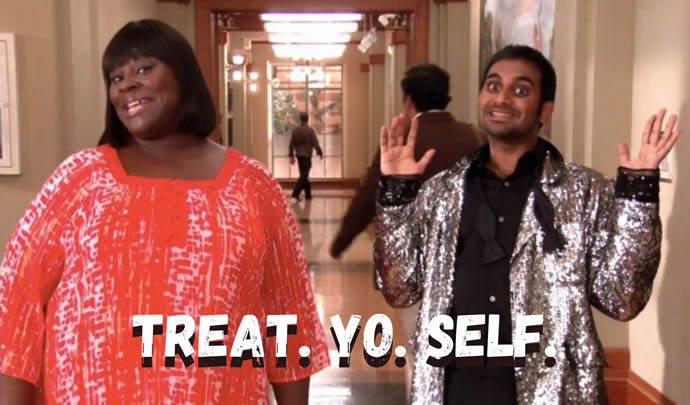 Remember when you were a kid and your parents had to essentially bribe you to get chores done?
Remember when you were a kid and your parents had to essentially bribe you to get chores done?
You know. One of these: “If you put the dishes away, you can play on the trampoline.”
Or maybe it was, “If you eat all of your vegetables, you can have a cookie.”
Or in my case: “If you finish your math homework, you can watch I Love Lucy.”
(Lucille Ball is the best, come on.)
One surprising thing I’ve learned from running my voiceover business is that it’s actually a lot like parenting—except in this case, you’re parenting yourself. There’s an element (or two…or ten…) of self-parenting needed for every business owner to find success. Call it discipline, call it motivation, call it “git ‘er done,” but it all boils down to accountability and keeping up your momentum—which, as most of us know, can be the biggest challenge of all.
Now, let me interject here and say that I am INCREDIBLY passionate about VO. I live and breathe this industry. I can’t get enough of it, and not a day goes by where I’m not baffled and incredibly grateful that I get to do this for a living. Are you kidding me? This is AWESOME.
But everyone runs out of steam once in a while, especially if you’ve got a lot on your to-do list and feel overwhelmed. Sometimes, it feels easier to just…not than to try to deal with the seven billion things you need to finish all at once.
This is where self-parenting comes in. And this is how I keep up my VO momentum:
- Set doable goals for yourself. By “doable,” I mean something you can realistically accomplish each day like, “Submit 10 auditions,” or “Reach out to 10 production companies.” It’s so much easier to set small, measurable goals for yourself than to say, “Right, I’m gonna audition for everything and book national commercials and be the greatest voice actor of all time by the end of the week.”
Listen, if you’re able to do that, give the rest of us a call, because we want to know what coffee you’re drinking! (Also…are you okay?) But otherwise, slow and steady wins the race—it’s about doable, measurable, consistent small goals and tasks.

- On that note: Know the difference between goals and tasks. Goals are bigger-picture things, like getting an agent in a market you’re after, or booking your dream client. Tasks are the smaller things you can do to accomplish that goal. So, for example, let’s say your goal is to voice commercials for BMW. That sounds lofty, right? Well, not if you break it down into manageable tasks, like:
- Find out which marketing agency handles BMW’s ads.
- Find out specifically who on that marketing team is responsible for creative direction. Reach out to that person.
- Find out if they partner with a production house—reach out to that production house. Even better, reach out to the producer or creative director.
- Get detailed—where are you going to contact them? Email? Phone? LinkedIn?
- Follow up! Sometimes, it takes a few knocks over the course of several months to hear back (and make sure you’re not being obnoxious about it. 😉
The point is to recognize that your goals can be big, but you’ll need doable tasks that act like steps on a staircase to get there!
- Reward yourself when you accomplish a task or a goal! Hello, self-parenting– except instead of getting a cookie for eating your veggies, you might want to structure it like this: “When you submit 10 auditions, you can [insert reward for yourself here].” Or, “When you send off all of your daily invoices, you can [insert fun thing here].”
Generally, my reward system looks like, “Once you voice these five jobs, you can take a fifteen-minute reading break.” Or: “Once you send in ten auditions, you can do yoga.” Or: “Finish up those marketing emails and you can get back in the booth and fire off a bunch of character work that you love.”
“Bribing” myself doesn’t mean I don’t love what I do. I adore it! This is just how I, personally, know I can set myself up for success—by working little “whoo hoo!” pats-on-the-back throughout my day to keep things rollin’. We all need to congratulate ourselves. (And we all need cookies for eating our veggies.) Figure out what rewards keep you going!
- Know when to give yourself a break. I don’t know about you, but I was a die-hard, intense little kid. (Nothing has changed; I’m just taller.) I would go, go, go, whether it was school or play or helping my mom garden in the backyard—I’d just keep going, like a deranged little Energizer bunny, until my parents actually had to say, “Okay, that’s enough, time for a break.”
The same principle applies to running your voiceover business. Being a business owner is incredibly rewarding, but it can also be a lot. That’s normal! It’s so important to give yourself permission to SLOW DOWN, take a deep breath, and regroup. Maybe that means you take a day off, give yourself an hour for lunch every day, or do what I’ve recently started to do and actually give yourself a weekend! (Remember those?)
Your productivity will be so much better once you allow yourself to stop. It doesn’t mean you’re lazy or a bad business owner; quite the opposite, actually! It means you know that you need regular time off so that when you come back, you’re energized and can’t wait to rock that mic. Ever since I started taking at least one full day off per week, my productivity has gone through the roof. I feel better mentally, physically, and emotionally, and it shows in my performances. I want my clients to get the best me—and that means I need to Mom myself and say, “no more work for today! Time to goof off!”

- Know when to ask for help. Hoo boy, this is a big one for so many people, myself included. When they first start out, many business owners (especially if you’re a Type A person like me) feel like they need to know everything and do everything That mindset can be helpful sometimes when it comes to developing resourcefulness and making sure you understand every aspect of your business, but there comes a time when you’ll start to know you need to turn to the experts for help.
At TVAS, we’re fortunate enough to have an amazing community of talented people who are more than happy to share resources, advice, and skillsets, from audio engineering assistance to performance tips to simply offering words of support and encouragement. If you know you’re struggling to deliver energetic reads, turn to a TVAS coach for one-on-one help. If you have no clue how to design a website, reach out to a web designer you trust. If, like me, everything left-brained like detailed tax prep and nitty-gritty accounting details are completely beyond anything you can possibly fathom, it’s time to find someone to manage your books for you. That’s what they’re there for!
Use your network. Just like you’re a pro when it comes to bringing a client’s script to life, other pros are there for you when you need help in an area that isn’t your strong suit.
It’s like the Avengers, or the Justice League, right? Everyone’s got a different skillset: pair ‘em up together, and they’re unstoppable. The same thing goes for your VO business.
(And if you want to dress like Batman in the booth, I absolutely do not blame you.)